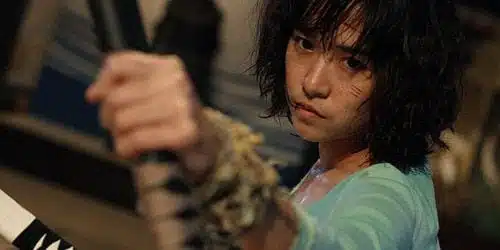
The world viewed through Zen’s (Jija Yanin Vismitananda) eyes is warped. This would be literally, as indicated by some subjective camerawork, and metaphorically, as indicated by the girl’s reactions to occasional upsets — say, flies that buzz too near or thugs who try to break her arm. Zen’s view has blurry edges and shifting focus, especially when she’s looking up from the floor, where she’s been unceremoniously deposited during a Muay Thai smackdown, or when she’s trying to decipher an opponent’s movements, to memorize and mimic them, and so, defeat said opponent. Her triumph, no matter how many times it occurs, is ever an underdog’s. And that makes it easy to absorb her view as your own.
Zen is the awkward, endearing, and plainly imperfect center of Prachya Pinkaew’s Chocolate (Chokgohlaet). Titled after her predilection for brightly hued M&M-style candies, the film offers sensational martial arts set pieces — beautifully choreographed, exquisitely colored, and acrobatically shot — as means of conveying the suitably named Zen’s sense of her threatening environment as well as her audaciously inarticulate navigation of it. For Zen, each moment is intensely present, physical and sensual. Erratic, lurching from contentment to frustration in split seconds, she reacts to dangers and desires with equal immediacy and without seeming thought, which makes her a perfect action hero, if also an emblem of “imperfection.” This last is laid out in the film’s opening moments, as a narrator says of Zen’s father (to-be: she has not yet been conceived in this prelude scene), “Masashi [Hiroshi Abe] loves things containing imperfections.”
So begins the film’s not-so-subtle mediation on the meanings, uses, and exploitations of such things, whether the imperfection be a physical scar (as appears on the eyebrow of Zen’s mother to be, Zin [Som Ammara Siripong]), a political-cultural taint (Masashi is an assassin and Yakuza, forced by Thai gangsters — and transvestites — to leave their turf for his native Japan, thus missing his daughter’s birth and childhood) or, in Zen’s case, an unspecified form of autism, a form that grants her dazzling, seemingly inexplicable and wholly thrilling martial arts genius, which is in turn premised on her excellent reading of rivals, situations, and especially, movies on TV.
It is from a TV viewing of Pinkaew’s Ong-Bak starring Tony Jaa, that Zen begins to absorb her particular skill set. Her mouth twitches, her hand clenches, and her eyes go wide as she observes Jaa’s moves, apparently now imprinted and available to her instant recall when she’s facing a street bully or, as happens increasingly, men with vendettas against or money owed to her mother. She discovers these fellows with Moom (Taphon Phopwandee), an orphan taken in by Zin and assigned to look after Zen. Ambitious, clever, and also community-inclined, he has Zen performing tricks for audiences in the street or in parks, soliciting cash in order to pay for Zin’s cancer treatment. As chemo makes her paler and weaker, the children redouble their fundraising efforts, especially when Moom stumbles on an accounts book listing Zin’s many former associates. It turns out she not only had a torrid affair with Masashi, but she was, previously, erstwhile girlfriend and number two for Thai mob boss No. 8 (Pongpat Wachirabunjong), indeed, the very boss who ran Masashi out of the country. Now, Moom rationalizes, he and Zen the Walking Weapon can shake down all these goons in order to pay for Zin’s survival.
Each of these encounters is stunning in its own way, reminiscent of the outrageous mass-assault scenes that showed up in and inspired Kill Bill, with balconies scaled and windows smashed, meat cleavers thrown, legs crunched, and swords swung. Each episode stands on its own as a mini-melodrama, sentimental but also packed with blood, wily gyrations, and deft whacks. JeeJa Yanin, her hair lank and hacked (during a particular fit of frustration, the asymmetry adding to her mystique), is a straight-up kick to watch, especially as she watches everyone around her, soaking up their strengths and weaknesses in order to turn every effort back on them. Her vengeance is visceral and so, strangely pure: she’s not carrying long-term grudges, only demanding, hand out each time, “mom’s money.” In one scene set in an orange-lit meat market, she’s so determined to keep the flies away, and so dons a scuba mask, the effect of which is to make her perspective that much more her own — Zen by way of Zen.
On hearing of their newly legendary adversary, No. 8 and his muscular lady-friends get hold of a pirate recording, watching the sensation on their TV. “She’s that good?” he wonders. “She’s extraordinary,” asserts his companion, “And she’s crazy.” This is the key to their foregone downfall, the villains’ belief that Zen is unfathomable, undisciplined, and “crazy.” She is not, of course, any of these things. She only processes information differently, and mostly better, than they do. Her autism is her gift, even as it becomes their curse. They arrive with guns and knives and large numbers. Unable to comprehend her, fearful and lumbering, the short-sighted bad guys are emblems of another sort of imperfection.

